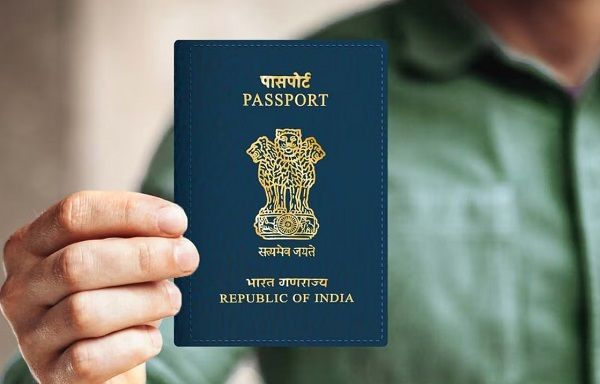

New Delhi. India’s passport, one of the world’s fastest growing economies, is today facing a bitter truth on the global stage. Earlier this year, a video of an Indian travel influencer went viral on social media, in which he expressed his displeasure over India’s ‘weak passport’. He had said that neighboring countries like Bhutan and Sri Lanka welcome Indian tourists with more open arms, but it is still very difficult to get visas to travel to Western and European countries. In fact, according to the latest data of Henley Passport Index 2025, the Indian passport has slipped to 85th position, which is a full five places down from last year’s 80th position. This means Indian citizens can now travel visa-free or visa-on-arrival to only 57 countries, down from 62 countries in 2024.
India lags behind even small countries
According to the report, the passport situation of a country with a big economy like India is worse than that of many small countries. For example, Rwanda (78th), Ghana (74th) and Azerbaijan (72nd) – all ahead of India, which ranks among the world’s five largest economies. In the last decade, India’s rank has often remained around 80 and in 2021 it had slipped to 90th place. Whereas Asian countries like Japan, South Korea and Singapore continue to remain at the top positions.
Singapore again on top, India limited to 57 visa-free countries
This year too, Singapore remains at the top position, whose citizens can travel to 193 countries without a visa. South Korea has visa-free access to 190 countries and Japan to 189 countries. In comparison, Indian passport holders can travel to only 57 countries without a visa – which is the same as the African country of Mauritania. Both the countries have got 85th position.
what does passport strength mean
Passport ranking is not just about the convenience of travel but is also a reflection of the soft power of a country. The index, released by Henley & Partners, is based on data from the International Air Transport Association (IATA), which measures visa-free access to 227 destinations in 199 countries. The strength of a passport reflects a country’s soft power, diplomatic influence and international identity. A stronger passport means its citizens enjoy greater travel freedom, better business opportunities and easier global mobility. A weak passport simply means more paperwork, higher visa fees, less travel facilities and longer wait times.
Countries are increasing mutual visa partnership
Interestingly, despite India’s rank falling, the number of visa-free countries has increased. In 2014, when Prime Minister Narendra Modi’s government came to power, 52 countries were visa-free for India. This number would increase to 60 by 2023 and 62 in 2024. However, in 2025 it will again come down to 57. Yet, India’s rank remains the same (85th) in both 2015 and 2025. This is because global mobility is increasing rapidly around the world. According to the Henley & Partners report, in 2006 the average traveler could visit 58 countries without a visa, while in 2025 this average has reached 109 countries.
Countries of the world are now pushing for bilateral travel agreements to strengthen their economies. China is a great example – moving from 94th in 2015 to 60th in 2025 as it expanded visa-free access from 50 to 85 countries. India moved up from 52 in 2015 to 57 by 2025, but faster progress by other countries pushed it down the ranking.
Reasons for India’s decline in ranking
India’s rank was 77th in July 2025, when Indian citizens were getting visa-free entry into 59 countries. But by October, two countries withdrew this facility, causing the rank to fall to 85th. According to the BBC, former Indian ambassador Achal Malhotra said that many other factors also affect the strength of a passport – such as economic and political stability, and the country’s migration policy.
He said Indians were allowed visa-free travel to many Western countries in the 1970s, but the situation changed after the Khalistan movement and internal turmoil in the 1980s. Now many countries are more cautious about immigration. A large number of people from India go and settle abroad or overstay their visa period, which affects the reputation of the country.
Strictness in visa policies is also a reason. Western countries like the US, UK and Canada have imposed strict rules on Indian travelers due to fear of illegal migration, overstay and fake applications. In discussions on platforms like Reddit, many users say that Indian tourists often do not respect local culture or bring with them bargaining habits, which makes countries reluctant to grant visa waivers.
What is the impact on passengers? lack of opportunities
This decline is creating practical challenges for Indian travellers. The visa process takes an average of 15-30 days, costs Rs 5,000-10,000, and the fear of rejection is always there. A travel influencer shared on social media that traveling to Europe with an Indian passport becomes a dream – the paperwork and waiting suck the life out of it.
Passport security and new technology
India’s passport is still considered vulnerable to security threats. In 2024, Delhi Police arrested 203 people on charges of visa and passport fraud. However, the government has recently launched the e-passport scheme. It contains an electronic chip that stores biometric information, making the passport difficult to counterfeit or tamper with. Experts believe that this technological step is in the right direction, but India will need to enter into more diplomatic agreements and travel partnerships to increase the global mobility of its citizens.